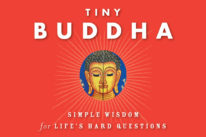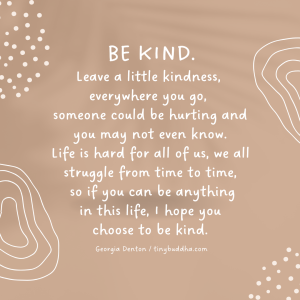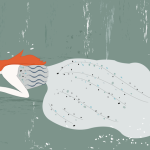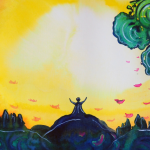
“We all have everything we need within us to create our fullest potential.” ~Abraham Maslow
Did you grow up with a critical, distant, or ignorant mother?
She probably made sure that your physical needs were covered, but she never noticed or understood your emotional needs. If she was anything like my mum, she may even have shamed you for having them!
You’re an adult now, and you have everything you need to be happy. So why aren’t you? Instead, you feel unworthy, disconnected, and lonely even when you’re with people you love. There’s this constant emptiness inside that makes you angry and sad at the same time.
Maybe you still long for a loving mother like you did when you were young, hoping that one day she’ll show up, or maybe you’ve given up hope that your mother will ever change.
Either way, she left open wounds inside your entire being—invisible traces of the trauma that you sustained. And you need to heal these wounds so that you can rediscover your true nature, activate your full potential, and live a life of your choice—a life filled with joy.
Healing is crucial for your health—mental, physical and spiritual alike. The good news is, you don’t have to live in misery waiting for the “perfect” day to start being happy. In fact, bringing more joy into your life now will help you heal.
Think about it this way: Joy is like the sun that eats away grey clouds and opens up the skies. Everything it touches brightens up and fills with the energy of growth.
Joy helps minimize the stress of the fight-or-flight reactions that you grew accustomed to because of to your traumatic past. It activates positive patterns in your brain instead, helping you heal and thrive.
Just like it helped me.
How I Learned to Speak Joy
I was thirty-one when I made the life-changing decision to move abroad, far away from the stress of the strained relationship with my mum. On the outside, I was a confident adult woman, the mother of a seven-year-old boy. But inside, I felt like a scared little girl longing for a safe place to hide.
Moving to a new country brought much positive change into my life. But, like nearly everything in life, with the good came a challenge.
Running from my narcissistic mum, I left behind everything I knew—everything I had built in my life. I also left Mum alone with my dear sick father in the age before the Internet, when international phone calls could bite holes in a family budget. What I wanted was a break from the pain inflicted by Mum’s behaviour, but I never stopped worrying about her and my dad.
I swapped my career in one of the country’s best medical centers for the life of a housewife, surrounded by strangers who spoke a language I didn’t understand. I uprooted my little boy and brought him to an unfamiliar place far away. We both felt like two survivors who had landed on another planet, and I needed all my strength just to stop myself from falling apart.
So how did I step beyond merely surviving, and begin to thrive? By making a conscious decision to live in the now and enjoy what I have.
As simple as it seemed, it was a challenge in itself. You see, Mum taught me that life was serious business, and neither fun nor joy belonged there. Fortunately, the healthy part inside of me knew what I needed: to master another “foreign” language—the language of joy. Fortunately, I listened.
“Even when you didn’t have the mother you needed, there’s a place inside your heart that totally knows how to love.” ~Jette Simon, psychotherapist
So, there I was, learning to enjoy mundane chores like vacuuming and cleaning bathrooms—what could be less joyful than that? But I would turn on MTV, sing along, and swing my hips to the tunes blazing out of the big black box of a TV we had back then. And that simple trick drizzled my life with positivity, helping me to turn boring, everyday stuff into pleasurable activities.
After that small success, I learned to seek and find joy in everything I did.
You may be unable to change every challenging circumstance of your life, but you can bring more balance to your emotional inner world.
Being a food lover, I experimented with local recipes, enjoying tickles of creativity and sharing the results.
My mother-in-law, Kirsten, who called me every day, clearly cared about us. Unfortunately, we didn’t speak a common language, and I needed something to make those conversations come alive. So, I made a list of the stuff I was usually doing—I’m vacuuming, reading, helping my son with his homework, and so on—and my husband translated it for me. This list became not only my first lesson in Danish, but it also brought joy to our connection and deepened our relationship.
I loved spending quality time with my son with no stress attached and enjoyed the growing feeling of closeness between us. I did my best to help him cope with new people and our new life, and in turn, he helped me.
I enjoyed my time alone, too—a walk with the dog (another language to learn!), sunbathing on the terrace, or reading a book. For the first time in my life, I could sit there doing nothing, and no one would criticize me for being “lazy” as Mum used to!
Spice up your daily activities to expand a flow of positivity and minimize reactivity patterns.
Looking back, I clearly see that I learned to be in the moment, pay attention to what I was doing, and do it with joy.
Gradually, my overall mood began to improve, and I could see my life in a brighter light. Each day started to look more like an adventure, with endless possibilities for joy presenting themselves.
It didn’t heal my trauma, of course, but it helped me get the best out of a turbulent time of change and prepared me for a healing journey.
Your Brain Still Remembers
The chronic stress of developmental trauma has a long-lasting impact on the brain. Overloaded with negative bias, some parts of your brain are overwhelmed and “acting out,” while others are numb, taken out of the game. You need to calm the loud ones and reactivate those that have gone quiet. By doing so, you re-center yourself and find a healthier emotional balance.
When you laugh, have fun, or simply enjoy the moment, troubles and worries step aside, and you enter another realm where you feel connected, safe, and loved.
Joy is inside you as a natural part of your true being. You simply need to find and reconnect with it.
Here’s how you can increase your ability to feel joy.
Acknowledge your current situation.
Put in words what you’re struggling with, why, and how it’s negatively impacting you—not to punish anyone but to clarify the challenge. Remember, denial keeps you stuck, but acknowledging things for what they are opens doors for personal growth, healing, and joy.
Now, knowing where you stand, ask yourself what you want your life to be and what you can do to get there. Possibilities for moving forward always exist; even small steps will take you closer to your goal.
Find balance in a state of control.
Either too much or too little control means co-dependency. Many people try to overcontrol their lives. To overcome this, let go of things that are beyond your control, like changing other people. Instead, focus more on self-growth.
In other cases, people allow their circumstances to dictate their lives, resulting in too little control or even no control at all. If that’s the case for you, it means taking matters into your own hands. Start with easier things like taking care of your well-being and choosing things that bring you joy. After that, work on saying no and building and defending strong boundaries.
Learn to tolerate difficult emotions.
To achieve a peaceful and joyful state, you must first learn to tolerate your difficult emotions. It’s not easy, but staying with your grief, anger, or shame can turn things around and free space for positive emotions. If you push these difficult feelings away, they will almost certainly eat you alive. Do you want to miss out on all the good stuff in life? I didn’t think so.
Validate your feelings instead of suppressing them, denying them, or pushing them away. You have the right to all of them! How could you not be angry, sad, or in mourning when you grew up without the loving mother you longed for as a child?
Working through painful feelings on your own can be tough, so ask your partner, a friend, or a therapist to support you during this time.
Live in the moment.
Did you know that multitasking is one of the biggest enemies of joy? It’s true! Taking on multiple tasks at once keeps your mind and body overloaded, and it’s impossible to enjoy yourself when you’re constantly changing activities. Focusing on one thing, on the contrary, allows joy to surface and bloom.
Learn to calm yourself.
Nobody is happy or relaxed all the time, but you can learn the skills and techniques to calm yourself when you need to. By doing so, you help your brain build more positive connections and open up for joy.
Mindfulness and mediation are two excellent techniques that help you to slow down and focus on the moment. If sitting silently cross-legged on a cushion isn’t for you, don’t worry, there are other ways to get the benefits of these practices. Anything that helps you focus, pay attention, and be present will do the trick.
Engage yourself fully.
No matter what you do, get completely involved in it. Even when you do something out of necessity, it’s possible to find joy in the action. Fully engaging in everything you do helps you discover new, exciting sides to boring stuff from your to-do list. And sometimes, adding fun to dull, repetitive activities like washing the dishes or waiting for the bus solves the problem and awakens joy.
Help or share.
Social connections bring lots of joy into your life, even if you’re just connecting on Zoom. Help people, or share something with them—a cup of coffee, a smile, or a passion of yours. For example, I like to bake, and blend facial tonics and creams; it helps me relax. But sharing my passions with others is what brings me profound satisfaction and joy.
And the effect stays for days and weeks—I promise!
Choose joy.
More joy means lower levels of inflammation in your body, better health, and greater happiness. You’re no longer a prisoner of your emotions and can consciously choose where you want to use your energy and how.
Activating joy helps you reconnect with an authentic, wise part inside of you that knows how to love. It means finally feeling like yourself and safe inside your skin—no matter what traumas you have endured throughout your life.
“Every moment, if it’s really inside of you, brings you what you need.” ~Rumi
Choose joy!
About Irina Bengtson
Irina is a daughter of a narcissistic mother, clinical psychologist and a founder of www.LoveGrowBeHappy.com. She combines her professional knowledge with a healing experience to help other daughters of narcissistic, hurtful mothers break free from their dysfunctional relationships. She’s a creator of online courses How to Set Boundaries and Protect Yourself from Hurt, The Ultimate Guide to De-stressing and Enjoying Life Now, and How to Cope with a Hurtful Mother and Reclaim Your Life.













 Though I run this site, it is not mine. It's ours. It's not about me. It's about us. Your stories and your wisdom are just as meaningful as mine.
Though I run this site, it is not mine. It's ours. It's not about me. It's about us. Your stories and your wisdom are just as meaningful as mine. 